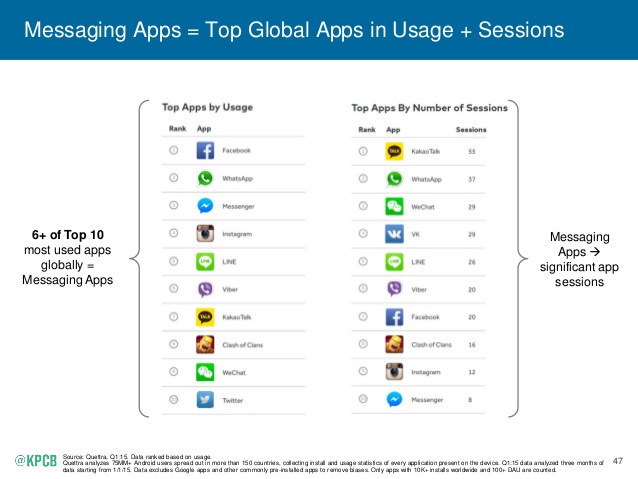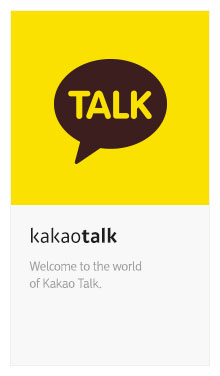A lunch chat with Sam Oh who is visiting UNC from Korea had me thinking about the variety of ways that chat apps are used in different cultures. Sam briefly explained the history and use of KaKaoTalk in Korea. His story of a Yahoo!-like company’s rebirth as a messaging app that has dominated Korean phones intrigued me so I starting looking for more about KakaoTalk.
The app began as a simple chat app and expanded into KakaoTalk, KakaoStory, KakaoMusic, KakaoGroup, KakaoHome, KakaoPlace, KakaoAlbum, KakaoPage, KakaoStyle, and KakaoAgit. Most of the names explain something about the focus of each service — all mobile oriented and working as a quick sharing service. Kakoa even breaks services off into their own apps — KakaoTaxi, KakaoBus, KakaoMetro etc.
KakaoTalk (according to Sam with details added from Wikipedia) derives its income from three main streams:
Gaming – 67.5% ($31.1M) in 2012. Mobile and social gaming with in game purchases including the Korean “national games,” Ani Pang and Dragon Flight. These games are not only the largest source of income but also serve to keep user engagement very very high — unlike other cleaner purer chat applications. If there is anything that other messaging app or any mobile app could learn from KakaoTalk, it’s how to increase engagement via gaming. Then to use that increased engagement to produce a very effective income stream.
Coupons (instead of banner ads) – 26.2% ($12.1M)
Emoji sales – 6.3% ($2.8M)
In the wake of Pokemon Go, this seem obvious. But if — say a month again — I told you that #noemail systems could be profitable by offering mobile social gaming, I would have gotten and perhaps deserved an eye roll response.
It turns out that this week we are all believers in mobile social gaming with augmented reality. And investors believe that there are profits to be had in that space.
At the moment, investors are seeing mobile social gaming as separate from messaging but KakaoTalk points toward integration as a solution for increasing engagement and income at the same time.
Looking at the top global apps on Android for the first quarter of 2015, Qualtra showed messaging apps dominate with the top four being owned by Facebook (Facebook itself, WhatsApp, Messenger and Instagram). [note: pre-installed Google apps are not included in the chart]. When it comes to number of sessions and for length of engagement, however, it’s KakaoTalk as number 1 by far.

Outside of Korea although installs of KakoaTalk are a much smaller percentage (in the US 1% of Androids for example), but the length of engagement is still the largest of any messaging app, reports SimilarWeb.
The problem facing KakaoTalk is how to get out of Korea and into other markets in a significant way. Is mobile social gaming integrated into a messaging app an anomaly or a pathway to success? Is KakaoTalk culturally and locally bound to Korea? Is the future to be found more in loosely connected apps for special purposes — a Clash of Clans + GroupMe for now and Pokemon Go + WhatsApp later –?



Leave a Reply
You must be logged in to post a comment.